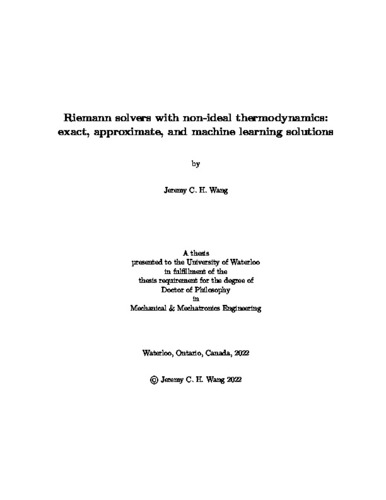| dc.contributor.author | Wang, Jeremy | |
| dc.date.accessioned | 2022-09-22 14:54:53 (GMT) | |
| dc.date.available | 2022-09-22 14:54:53 (GMT) | |
| dc.date.issued | 2022-09-22 | |
| dc.date.submitted | 2022-09-12 | |
| dc.identifier.uri | http://hdl.handle.net/10012/18778 | |
| dc.description.abstract | The Riemann problem is an important topic in the numerical simulation of compressible flows, aiding the design and verification of numerical codes. A limitation of many of the existing studies is the perfect gas assumption. Over the past century, flow technology has tended toward higher pressures and temperatures such that non-ideal state equations are required along with specific heats, enthalpy, and speed of sound dependent on the full thermodynamic state. The complexity of the resulting physics has compelled researchers to compromise on rigour in favour of computational efficiency when studying non-ideal shock and expansion waves. This thesis proposes exact, approximate, and machine learning approaches that balance accuracy and computational efficiency to varying degrees when solving the Riemann problem with non-ideal thermodynamics.
A longstanding challenge in the study of trans- and supercritical flows is that numerical simulations are often validated against prior numerical simulations or inappropriate ideal-gas shock tube test cases. The lack of suitable experimental data or adequate reference solutions means that existing studies face difficulties distinguishing numerical inaccuracies from the physics of the problem itself. To address these shortcomings, a novel derivation of exact solutions to shock and expansion waves with arbitrary equation of state is performed. The derivation leverages a domain mapping from space-time coordinates to characteristic wave coordinates. The solutions may be integrated into a suitable Riemann solution algorithm to produce exact reference solutions that do not require numerical integration.
The study of wave structures is also pertinent to the development of practical Riemann solvers for finite volume codes, which must be computationally simple yet entropy-stable. Using the earlier derivations, the idea of structurally complete approximate Riemann solvers (StARS) is proposed. StARS provides an efficient means for analytically restoring the isentropic expansion wave to pre-existing three-wave solvers with arbitrary thermodynamics. The StARS modification is applied to a Roe scheme and shown to have improved accuracy but comparable computational speed to the popular Harten-Hyman entropy fix. Four test cases are examined: a transcritical shock tube, a shock tube with periodic bounds that produce interfering waves, a two-dimensional Riemann problem, and a gradient Riemann problem---a variant on the traditional Riemann problem featuring an initial gradient of varying slope rather than an initial step function. Additionally, a scaling analysis shows that entropy violations are most prevalent and yield the greatest errors in trans- and supercritical flows with large gradients.
The final area of inquiry focuses on FluxNets, that is, learning-based Riemann solvers whose accuracy and efficiency fall in between those of exact and approximate solvers. Various approaches to the design and training of fully connected neural networks are assessed. By comparing data-driven versus physics-informed loss functions, as well as neural networks of varying size, the results show that order-of-magnitude reductions in error compared to the Roe solver can be achieved with relatively compact architectures. Numerical validation on a transcritical shock tube test case and two-dimensional Riemann problem further reveal that a physics-informed approach is critical to ensuring smoothness, generalizability, and physical consistency of the resulting numerical solutions. Additionally, parallelization can be leveraged to accelerate inference such that the significant gains in accuracy are achieved at one quarter the runtime of exact solvers. The trade-off in accuracy versus efficiency may be justified in the case of non-ideal flows where even minor errors can result in spurious oscillations and destabilized solutions. | en |
| dc.language.iso | en | en |
| dc.publisher | University of Waterloo | en |
| dc.relation.uri | https://git.uwaterloo.ca/jc9wang/analytical_shocks_and_rarefactions | en |
| dc.relation.uri | https://git.uwaterloo.ca/jc9wang/structurally-complete-riemann | en |
| dc.relation.uri | https://git.uwaterloo.ca/jc9wang/fluxnet | en |
| dc.subject | computational fluid dynamics (CFD) | en |
| dc.subject | numerical methods | en |
| dc.subject | transcritical thermodynamics | en |
| dc.subject | entropy | en |
| dc.subject | Riemann solver | en |
| dc.subject | machine learning | en |
| dc.subject | high-speed flow | en |
| dc.title | Riemann solvers with non-ideal thermodynamics: exact, approximate, and machine learning solutions | en |
| dc.type | Doctoral Thesis | en |
| dc.pending | false | |
| uws-etd.degree.department | Mechanical and Mechatronics Engineering | en |
| uws-etd.degree.discipline | Mechanical Engineering | en |
| uws-etd.degree.grantor | University of Waterloo | en |
| uws-etd.degree | Doctor of Philosophy | en |
| uws-etd.embargo.terms | 0 | en |
| uws.contributor.advisor | Hickey, Jean-Pierre | |
| uws.contributor.affiliation1 | Faculty of Engineering | en |
| uws.published.city | Waterloo | en |
| uws.published.country | Canada | en |
| uws.published.province | Ontario | en |
| uws.typeOfResource | Text | en |
| uws.peerReviewStatus | Unreviewed | en |
| uws.scholarLevel | Graduate | en |

